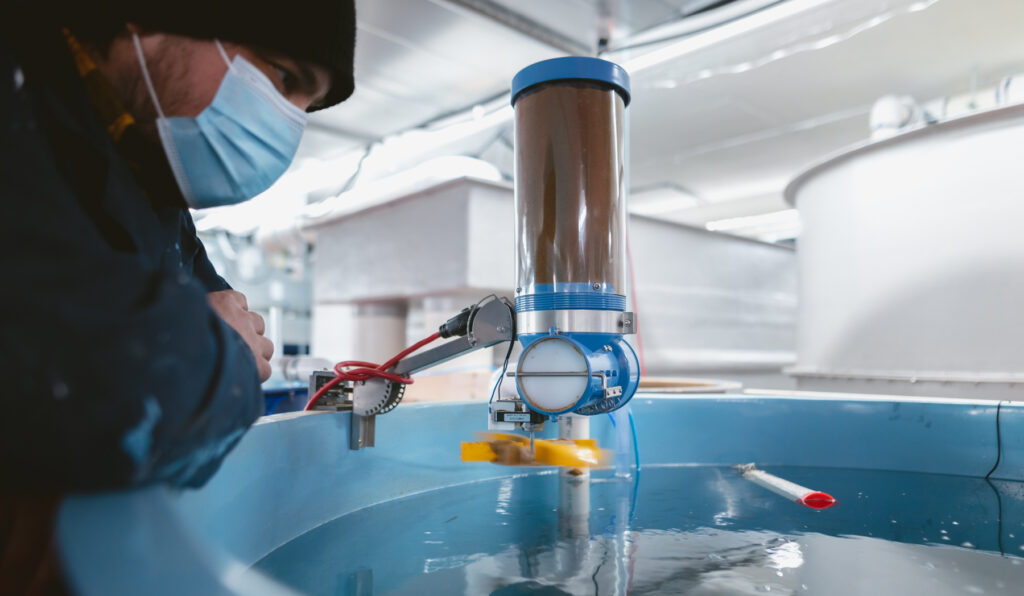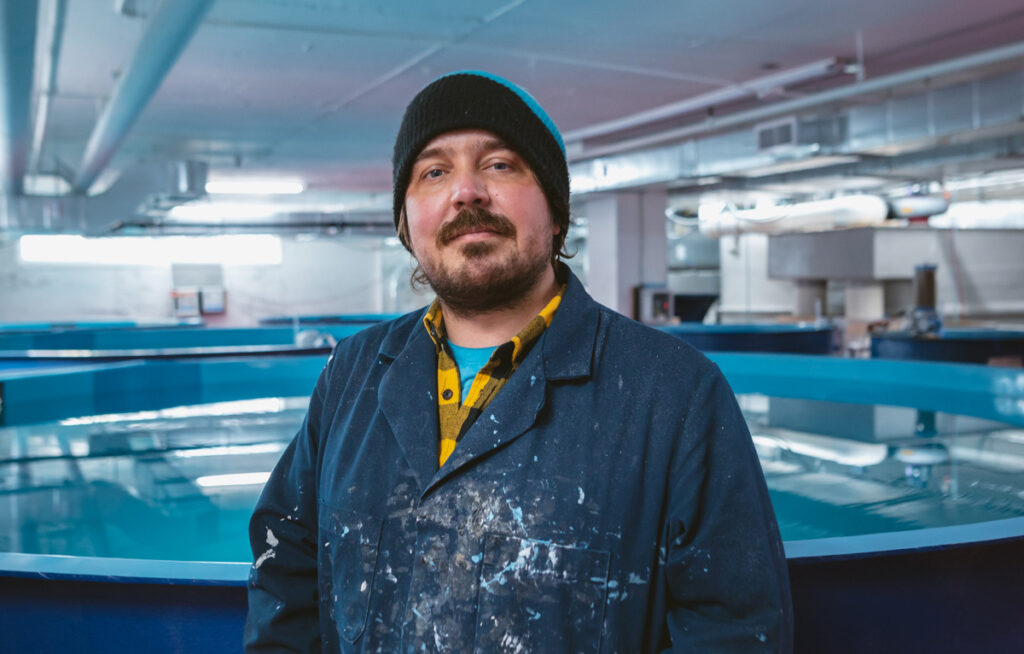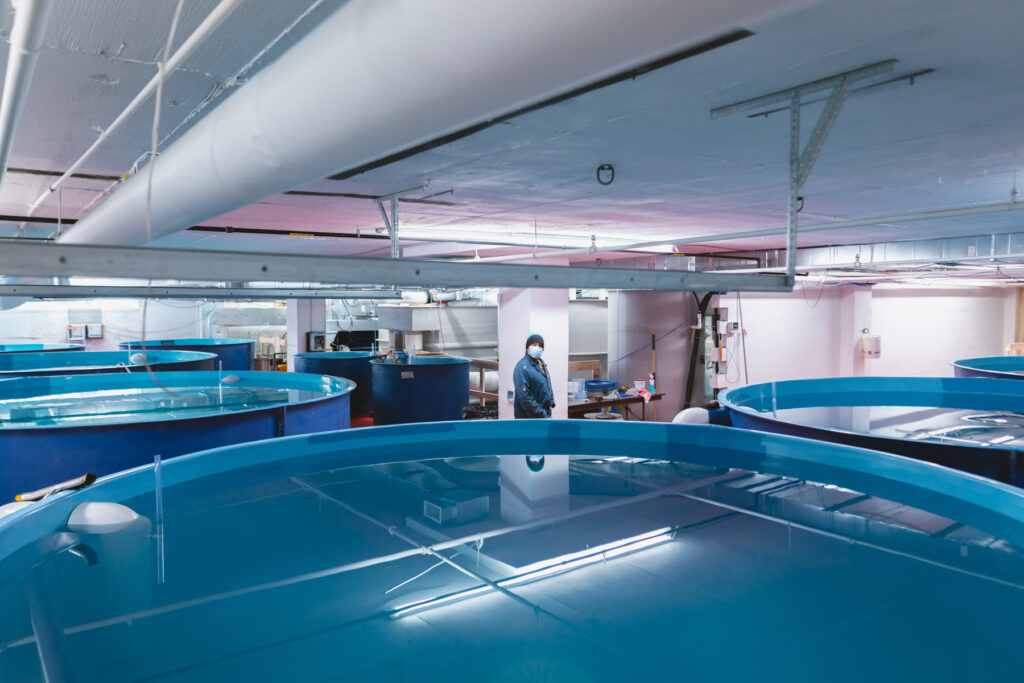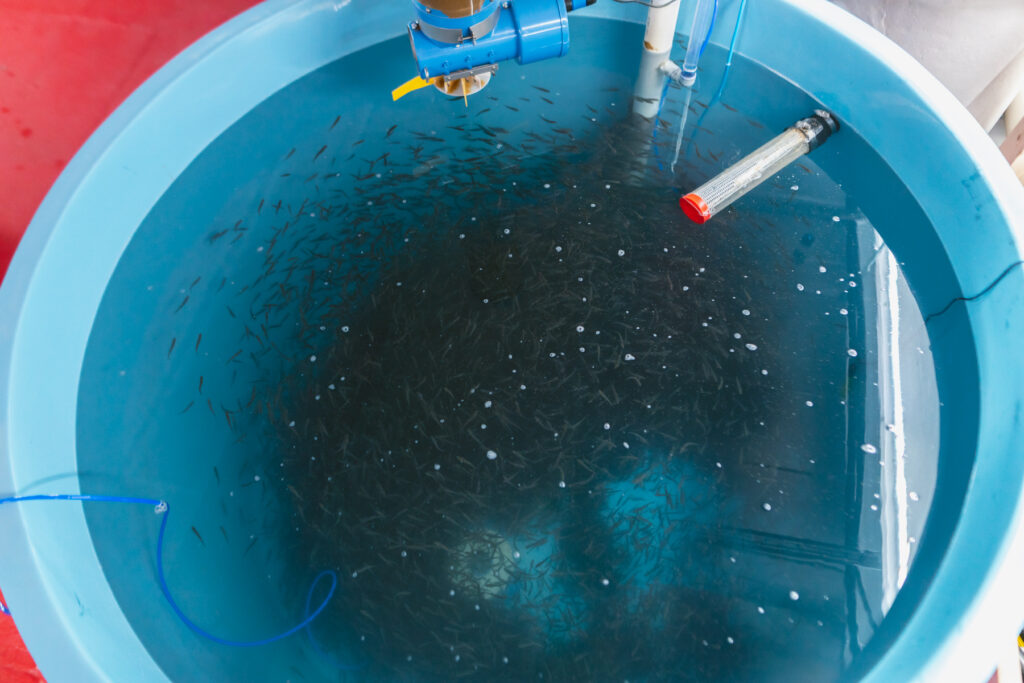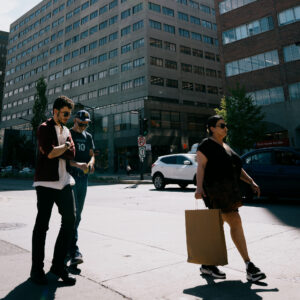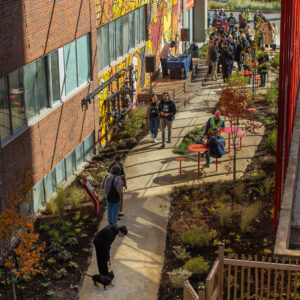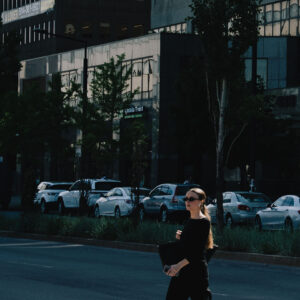NEWS FROM RIGHT HERE
February 24, 2022
Opercule: A fish farm in the heart of the city
Opercule: the very first recirculating urban fish farm in Quebec is starting up. Located in the District Central, the business plans to produce Arctic char within a few months, which it will sell and deliver directly to Montreal restaurant owners by electric bike. It’s the picture of a small urban farm with big ambitions.
It was along the long road connecting Montreal and Grande-Rivière, in the Gaspésie, that David Dupaul-Chicoine and Nicolas Paquin had the idea of creating the first urban fish farm in Quebec. Both men were students at École des pêches et de l’aquaculture du Québec and often had to go there, so they had plenty of time to talk. “We spent many hours thinking up ideas, one more far-fetched than the last,” says Nicolas Paquin.
After completing their training, David and Nicolas decided to create an aquaculture project in Montreal in 2018. Easier said than done! The rules of the Ministère de l’Agriculture, des Pêcheries et de l’Alimentation du Québec are so strict, just like those concerning the environment. The co-founders therefore decided to set up shop in the heart of the city. “Given the regulations in effect, it was the most logical solution and it also made it easier to get closer to our market,” explains Nicolas.
Eggs from the Yukon
After two years of applying for and obtaining permits from various levels of government, Opercule launched its operations in 2021. “We started construction and have been in intensive construction since July! On November 22 of this past year, we finally received our first shipment of eggs from the Yukon,” reveals Nicolas. The 60,000 eggs of Arctic char, a native species in the same family as salmon and steelhead, are just beginning to hatch and small fry are already wriggling in the newly installed Opercule ponds. The co-founders have opted for a recirculation system that will allow them to recycle 99.5% of the water. “For all of our production, we will use about 14 litres of water per minute, contrary to a traditional fish farm which would use several thousands of litres per minute,” says Nicolas.
A central, urban, and vibrant neighbourhood
Based in a 5,000 square foot space, Opercule found its footing in the District Central. Since the two entrepreneurs are aiming for local distribution, the area is ideal for easy delivery by electric bike. “It’s really central to the Montreal area. We’ll be able to reach restaurant owners directly,” adds Nicolas. Also, a fish farm requires large installations, which require space and a special layout. “The District Central is the ideal spot for this type of operation. And the owner was very understanding, given that it is the first urban fish farm of its kind in Quebec! The owner had to be open-minded enough to accept this type of project,” adds Nicolas.
The building David Dupaul-Chicoine and Nicolas Paquin chose was not by chance. It is the one where the Centrale agricole, an urban agriculture cooperative with the same values as the duo behind Opercule, operates. It is this cooperative that is subletting its premises to the fish farm. “It brings together producers and processors. It allows us to create great synergies and a circular economy, because some of our waste will become raw materials for other businesses. We will truly be able to optimize our prices through this reuse”, explains Nicolas. In fact, the sludge formed by fish waste contains a lot of nitrate and phosphorus, elements that can become good fertilizers for plants, for example.
Little fish, big fish
For Opercule, 2022 will be about farming, with the fry slowly turning into fish. “Right now, we are focusing on getting the farm up and running. Then, it will be a matter of creating partnerships with other businesses in the area,” explains Nicolas. Within a year, the farm will produce fish weighing 350 to 400 g. It will only be in 2023 that these chars will reach 2.5 to 3 kg. “We carry out the entire rearing process, from the egg to a marketable size, in a recirculation system, which is a first in Quebec,” concludes the co-founder. The company also has plans to expand and improve, but that’s for later…first, little fish must become big fish!
Translated from original text by Elizabeth Pouliot
Together Toward a Territorial Resilience Plan for District Central
The SDC District Central is embarking on a large-scale project to create its Territorial Resilience Plan for 2027-2030. As a recognized metropolitan innovation zone and a key economic driver for…
Read MoreAGM 2026 – Notice of meeting
Invitation – AGM 2026 DISTRICT CENTRAL BUSINESSES, THIS EVENT IS FOR YOU! Join the members of the Board of Directors and the SDC District Central team for an in-person Annual…
Read MoreA District Dedicated to Quebec’s Economic Self-Reliance
District Central is 25 million square feet. Photo credit: Branden Desormeau Pandemic, inflation, trade wars with the United States… every time a crisis breeds economic uncertainty, the importance of local…
Read More
